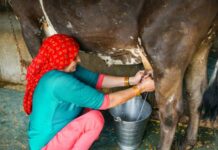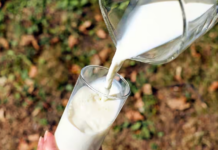New Delhi, May 12, 2020: COVID-19 has affected the lives and livelihoods of millions across the world. The virus has taxed dairy farmers in a number of ways, the first being management of dairy animals and second the marketing and sale of milk and other by-products. Due to the lockdown, all eateries and sweet shops are closed, leading to low demand for milk and other dairy products. Milk prices have fallen, putting further stress on farmers. Every new challenge teaches us something, and COVID-19 has made dairy farmers learn several lessons and given them new insights for future management and growth.
Emergency Plan: All dairy farms must have in place a well-designed plan that can be implemented during any emergency. The plan must be tested once in two years for its practical utility. Few workers at the farm must be permanently employed and live on the farm. Entry of relatives/friends of workers and other people should be banned.
Farms must have an ‘emergency kit’ consisting of basic medicines and instruments for medical aid. Another ‘equipment/ survival’ kit containing halter, ropes, edible vegetable oils, activated charcoal, tarpaulin, pliers, battery, wire etc must be available. Dairy farms should have surplus bamboo sticks. During emergency, these can be used to construct close compartments and animals can be confined in groups based on their age and production status.
It will restrict the movement of individual animals leading to almost 30 per cent reduction in energy requirements. A well-maintained, movable generator set must be available along with sufficient amount of fuel as a back-up source of electricity.
Bio-security & Hygiene: Essential to check disease, bio-security and hygiene are paramount for the well-being of animals. Main gate of the farm should remain closed at all times. One worker may be entrusted with the job of a watchman to check trespassing and entry of stray animals. Farm cleanliness and personnel hygiene should get due attention.
Feed: Commercial farms must have a stock of stored/preserved fodder (silage or hay) which could last for at least two to three months. Small farms can have wheat/paddy straw or maize. A farmer must know the method of enriching wheat straw with urea. Feeding this enriched wheat straw to animals can provide higher amount of protein.
The sorghum should never be harvested at a young stage. It may cause acute toxicity with laboured breathing, excessive drooling of saliva and red conjunctiva. Farms that experience shortage of both green fodder and concentrate ration must possess Uromin Licks. These can provide all nutrients needed for maintenance purposes. Prepared feed cannot be stored for more than a fortnight; however its ingredients (cereals, cakes, mineral mixture and salt) should be stored as a back-up.
Health Status: A farmer must be trained for first aid management or AI of animals. Semen doses in good number with proper storage, vaccination, de-worming, sample testing etc. should be followed in a planned manner.
Insurance: All animals including young and old should be insured.
Records: Properly maintained and relevant records will help in the quick evaluation of profit or loss situation and aid future strategies. Contacts and telephone numbers of personnel/organizations which could extend help during an emergency should be displayed at a frequently visited spot on the farm.
Value addition: Farm gate milk processing — paneer or curd can be done for sale. When selling or disposal of milk becomes a serious problem, it can be processed into products like ghee or milk powder, which have a longer shelf life.
Miscellaneous: A farm must have a well-maintained vehicle for transporting milk to factory in case a milk van fails to turn up. Milk drums/bulk milk cooler of sufficient capacity be available to store surplus milk. Farmers must possess sufficient cash in hand to run farm activities, as banks and ATMs may be closed during emergency. Sufficient stock of sanitizers and disinfectants must be ensured. A multi-purpose cart to transport carcasses of dead animals to hadda-rori is a must. The resting place of workers, milking parlour, implement shed etc should be disinfected regularly with bleaching powder/carbolic acid/ caustic soda etc.
A radio set should be available and accessible to all workers. This will enable them to know the current situation in the local area or the state. Farmers should evaluate the overall situation once the emergency is over. Farmers who have developed strong linkages with veterinary university/institute, various associations and fellow farmers may gain many benefits during crisis situations.
The linkages should be further strengthened with those agencies that have provided valuable help during a crisis period. In Punjab, 14 lakh households are rearing cattle and have the highest per capita milk availability in the country; contributing 12.59 MT to the National milk pool (6.7 per cent of the total milk).
Directorate of Extension Education, Guru Angad Dev Veterinary and Animal Sciences University, Ludhiana.



























